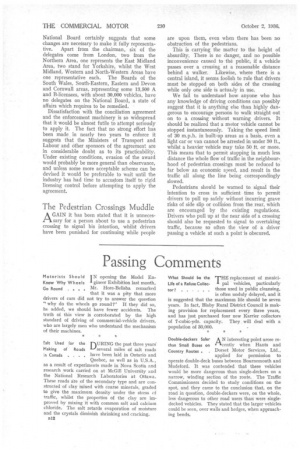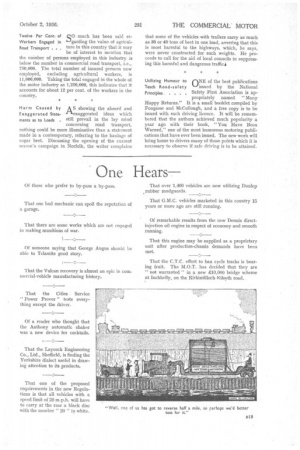Passing Comments Motorists Should IN opening the Model EnKnow Why W heels I gineer Exhibition last month,
Page 22

Page 23

If you've noticed an error in this article please click here to report it so we can fix it.
Go Round . . . Mr. Hore-Belisha remarked .
that it was a pity that more drivers of cars did not try to answer the question "why do the wheels go round'?" If they did so, he added, we should have fewer accidents. The truth of this view is corroborated by the high standard of driving of commercial-vehicle drivers, who are largely men who understand the mechanism of their machines.
salt Used for the URING the past three year Making of Roads L'several miles of salt roads in Canada . . . . have been laid in Ontario and
Quebec, as well as in U.S.A., as a result of experiments made in Nova Scotia and research work carried on at McGill University sod the National Research Laboratories at Ottawa. These roads are of the secondary type and are constructed of clay mixed with coarse minerals, graded to give the maximum density under the stress of traffic, whilst the properties of the clay are improved by mixing it with common salt and calcium chloride. The salt retards evaporation of moisture and the crystals diminish shrinking and cracking.
What Should be the --r'HE replacement of municiLife of a Refuse CollecI pal vehicles, particularly
tor? those used in public cleansing, is often unduly delayed, and it is suggested that the maximum life should be seven years. In fact, Blaby Rural District Council is making provision for replacement every three years, and has just purchased four new Karrier collectors of 7-cubic-yds. capacity. They will deal with a population of 30,000.
Double-deckers Safer A N interesting point arose rethan Small Buses on r-kcently when Hants and Country Routes . . Dorset Motor Services, Ltd.,
applied for permission to operate double-deck buses between Bournemouth and Mudeford. It was contended that these vehicles would be more dangerous than single-deckers on a narrow, winding section of the route. The Traffic Commissioners decided to study conditions on the spot, and they came to the conclusion that, on the road in question, double-deckers were, on the whole, less dangerous to other road users than were singledecked vehicles. They stated that the larger vehicles could be seen, over walls and hedges, when approaching bends.
S0 much has been said regarding the value of agriculture in this country that it may be of interest to mention that the number of persons employed in this industry is below the number in commercial road transport, i.e., 750,000. The total number of insured persons now employed, excluding agricultural workers, is 1f,000000. Taking the total engaged iii the whole of the motor industry as 1,250,000, this indicates that it accounts for about 12 per cent. of the workers in the country.
Twelve Per Cent. of Workers Engaged in Road Transport . . .
Harm Caused by A S showing the absurd and Exaggerated Stater-l-exaggerated ideas which menu as to Loads . still prevail in the lay mind
concerning road transport, nothing could be more illuminative than a statement made in a contemporary, referring to the haulage of sugar beet. Discussing the opening of the current season's campaign in Norfolk, the writer complains that some of the vehicles with trailers carry as much as 30 or 40 tons of beet in one load, averring that this is most harmful to the highways, which, he says, were never constructed for such weights. He proceeds to call for the aid of local councils in suppressing this harmful and dangerous traffic,'
Utilizing Humour to (INE of the best publications Teach Road-safety •--fissued by the National Principles. . . . . Safety First Association is ap
propriately named "Many Happy Returns." It is a small booklet compiled by Fougasse and McCullough, and a free copy is to be issued with each driving licence. It will he remembered that the authors achieved much popularity a year ago with their book, "You Have Been Warned," one of the most humorous motoring publications that have ever been issued. The new work will bring home to drivers many of those points which it is necessary to observe if safe driving is to be attained.




















































































